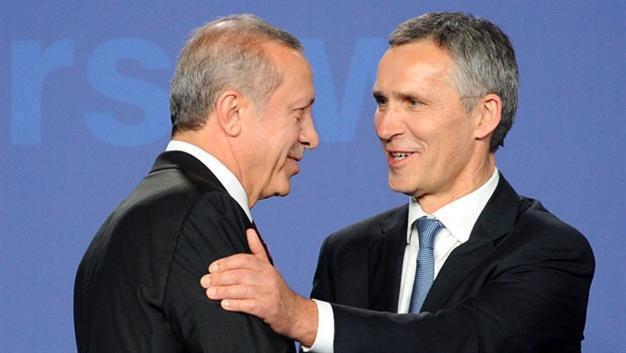
Turish Presitqdent Erdoğan (L) and NATO Secretary General Stoltenberg are seen at the Warsaw summit. AA photo
NATO leaders agreed July 9 on a set of decisions to project stability beyond the alliance’s borders, including the use of AWACS surveillance aircraft in the Turkish sky to support strikes by the U.S.-led coalition against the Islamic State of Iraq and the Levant (ISIL) in Syria and Iraq.
“We will provide AWACS support and the plan is to have them to flying over international airspace and Turkey and that will allow us to look into airspace in Iraq and Syria,” NATO Secretary-General Jens Stoltenberg told a news conference July 9. “This is a clear signal of our resolve to help tackle terrorism.”
The planes are one of the few concrete assets that NATO has, with most of its military hardware belonging to individual member states.
AWACS are aircraft with powerful radars that allow them to monitor airspace for hun-dreds of kilometers around. They can also be converted into command posts to coordinate bombing raids and other air operations.
The Warsaw summit closing statement said that “NATO AWACS aircraft will be made available to support the Counter-ISIL Coalition.”
“We’re moving forward with the most significant reinforcement of our collective defense any time since the Cold War,” U.S. President Barack Obama said at a news conference at the end of the summit.
NATO’s chief diplomat also emphasized the alliance would consider further reassurance measures to defend Turkey against all possible threats from Syria.
“Turkey is the NATO ally most affected by the turmoil and violence to the south,” he told reporters.
“We are working closely with Turkey on how to expand assurance measures in Turkey,” he added.
NATO has deployed Patriot and SAMP-T batteries in Turkey’s southeast to defend Turkish territories from possible missile attacks from Syrian territories.
Training mission in Iraq
In Warsaw, NATO also agreed to take further steps to boost counter-terrorism efforts in countries in the Middle East and North Africa, Stoltenberg said.
It would deploy a team to Baghdad to start a new training scheme in Iraq, which is bat-tling ISIL jihadists.
“To the south we see failed and failing states. And millions left homeless and hopeless by terrorist groups like ISIL,” Stoltenberg said.
“That is also important for Turkey because Turkey is bordering both Syria and Iraq. And everything we do to fight ISIL will also be of great benefit for Turkey,” he said.
The alliance will also start providing support for the Tunisian special forces and set up an intelligence “Fusion Center” in Tunisia.
Afghanistan mission extended
NATO countries agreed on July 9 to extend their non-combat training and assistance mis-sion in Afghanistan amid continuing threats from the Taliban.
“We agreed to sustain our Resolute Support Mission beyond 2016 through a flexible, re-gional model,” Stoltenberg said.
NATO will further launch a maritime security operation in the Mediterranean to help deal with the migration crisis and the chaos in the waters off Libya.
Stoltenberg said the alliance will launch a new maritime operation in the Mediterranean called Operation Sea Guardian, whose responsibilities will include counterterrorism. NATO will also cooperate with the European Union’s efforts to shut down human smuggling oper-ations that have fueled Europe’s greatest migrant crisis since World War II.
Obama, who was attending his last NATO summit, called it “a pivotal moment for our alliance.”
“In nearly 70 years of NATO we have perhaps never faced such a range of challenges all at once – security, humanitarian, political,” he said. But he concluded that with the multi-faceted efforts being made, “NATO is as strong, as nimble and as ready as ever.”
Carter meets Turkish counterpart
Meanwhile, U.S. Secretary of Defense Ash Carter met Turkish Minister of Defense Fikri Işık met on the sidelines of the NATO summit on July 9.
Carter vowed the United States would continue to work intensively with Turkey to coun-ter the threat of terrorism of any kind, with both nations’ militaries standing shoulder-to-shoulder at the İncirlik Air Base and elsewhere, according to a statement released by his of-fice.
Turkey and Poland signed a cooperation agreement on July 8 in the field of electronic warfare capabilities.
The letter of intent signed between Işık and his Polish counterpart, Antoni Macierewicz, on the sidelines of the NATO summit aims to develop the capabilities of NATO allies in the field of electronic warfare.
The two countries will also develop projects to enhance NATO’s electronic warfare capa-bilities and expect other NATO allies to join the initiative, Turkish Defense Ministry sources said.
The Warsaw summit, NATO’s first in two years, was considered by many to be the alli-ance’s most important since the Cold War.
On July 8, NATO leaders approved the deployment of four multinational battalions to Po-land and the Baltic states to deter Russia, as well as a Romanian-Bulgarian brigade for the Black Sea region. Germany will lead a multinational battalion in Lithuania, with similar bat-talions to be led by the United States in Poland, Britain in Estonia and Canada in Latvia.
Obama pledged an “unwavering commitment of the United States to the security and de-fense of Europe” and said the common defense of the trans-Atlantic alliance would never change.
“In good times and bad Europe can count on the United States,” he said.